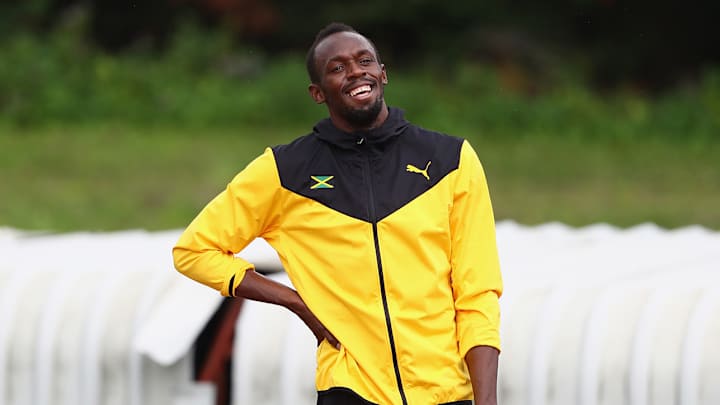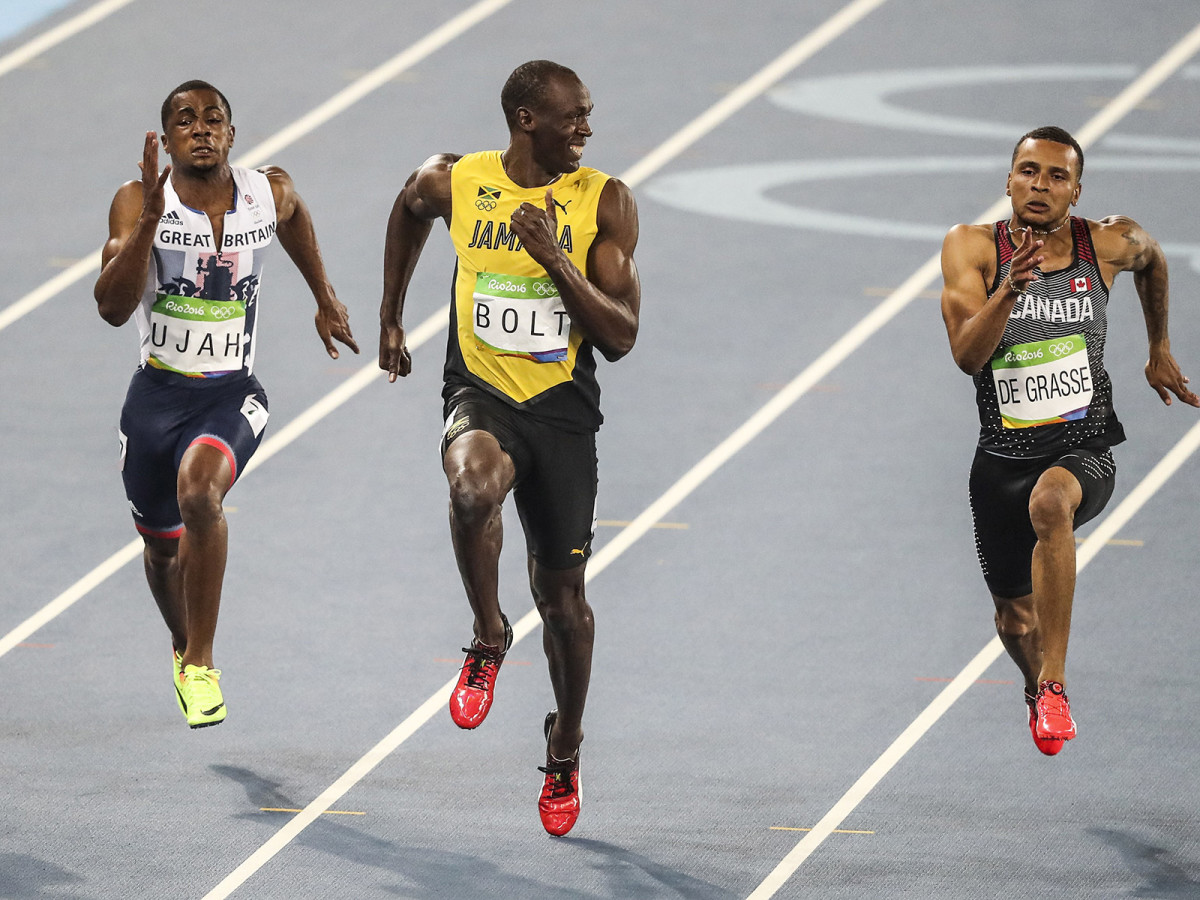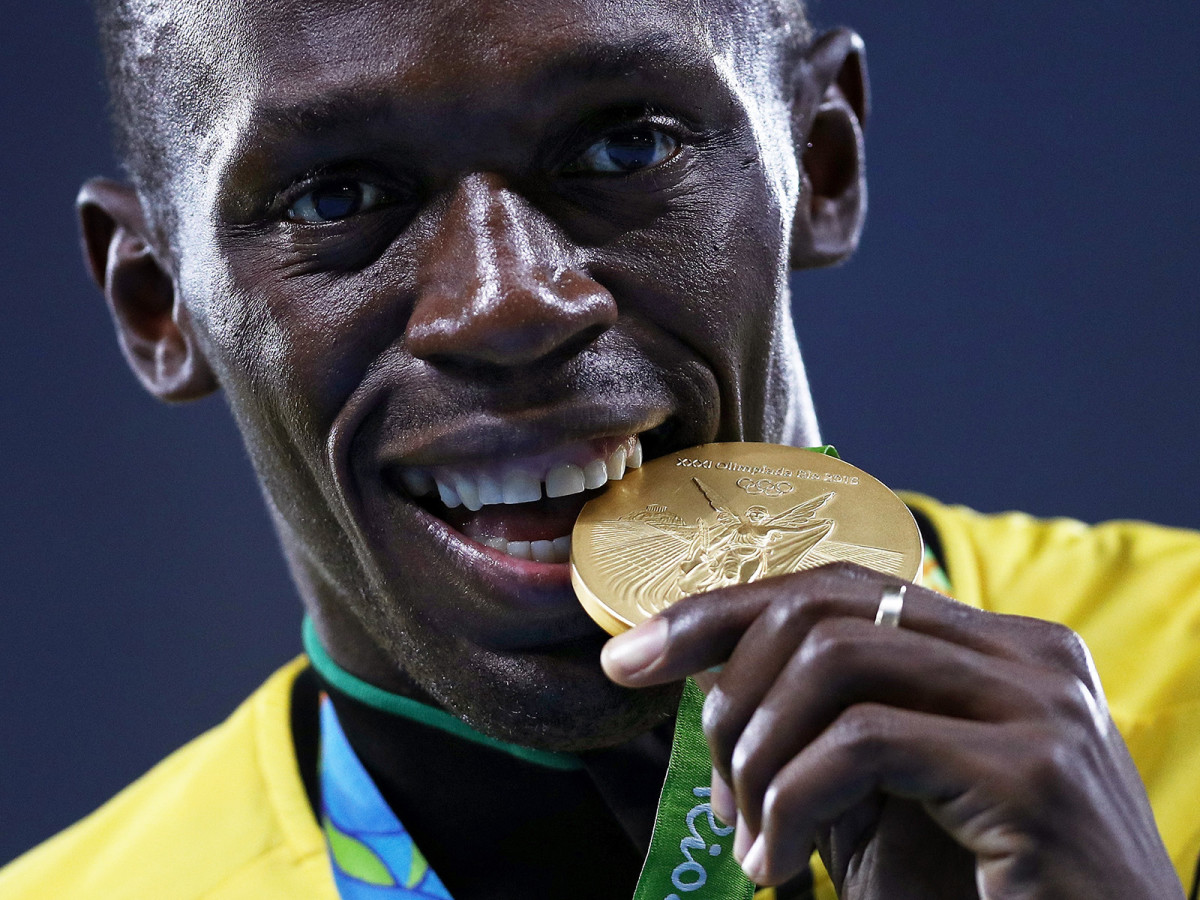Usain Bolt's Decade-Long Party Reaches the Finish Line

On Saturday at the world championships of track and field in London, Usain Bolt will run what he has said repeatedly—for the better part of five years—will be the last individual race of his career, in the final of the 100 meters. He is expected to run on Jamaica’s 4X100-meter relay a week later, which will be his final appearance on any track. And then he will be gone.
Probably. Let’s get this out of the way right up here: I understand that there is cynicism about Bolt’s retirement and a smirking assumption that he will unretire at some point. Sure. Maybe he will. He’s only 30 years old (31 on Aug. 21) and there’s still good money in being Bolt on the track. But I think there’s a good chance this retirement will take. The usual reason: Bolt has never loved training and he can finally put that behind him. (He also doesn’t love daylong photo shoots and many of the other duties required of millionaire celebrity athletes, although he’s all about many of the other perks). A more tangible reason: He’s older and slower—Bolt has run faster than 9.80 seconds in the 100 meters only twice since the 2012 Olympics, at the finals of the 2013 and ’15 worlds. His winning time in Rio was 9.81. His untouchable world record of 9.58 is eight years old.
Watch: Usain Bolt wins final 100 meter race in Jamaica
He has spent a decade or more managing chronic back issues. The job of being Bolt, while still lucrative, is more difficult. Even if he were to stick around, there’s no guarantee that he will keep winning races. There’s no guarantee that he will win Saturday (although the rest of the world hasn’t torn up the 100 meters this year, either; Bolt’s best is only 9.95, but the only sub 9.90 performance this year was a 9.82 by 21-year-old Christian Coleman of the U.S. two months ago at the NCAA Championship meet in Eugene. The withdrawal of Canadian Andre DeGrasse this week further weakened the field). Superman Bolt is done. It’s hard to imagine him grinding out another year or two, or all the way to 2020, running in the 9.90s and leaning at the tape to win races. But he could. I’m just betting it won’t happen.
So let’s assume this is the end. We as a sports culture are accustomed to saying goodbye to athletes. The routine is well-practiced. Highlights, memories, a final flash of brilliance. Applause. Laughter. Tears. Curtain drops. We are insulated from genuine, deep sadness by the security that comes from knowing that greatness replaces itself. Bird and Magic left, Jordan came along. Jordan left, Lebron came along, and then Curry. Etcetera. Pick your sport. Track and field, which unfolds in ponderous afternoons and evenings, translated—but also burdened—by arcane statistics and worshipped by an increasingly vertical audience (like many Olympic sports in this regard), derives any crossover appeal from the superstars who periodically arrive at the starting line and nudge their way into mainstream. Bolt arrived, as a superstar, in 2008. And he didn’t nudge his way anywhere; he exploded.
It started with a single race, the 2008 Olympic 100-meter final in Beijing. On that night Bolt separated from the fastest men in the world—all of them athletic freaks, let’s be honest—with stunning ease. He unfurled his entire 6'4" frame and swallowed ground in giant chunks. (I’ve since seen this effect, close-up, in training; it’s intoxicating, like CGI in real life. Spikes ripping over the track, a body passing, generating a breeze. Bolt is not just fast, he’s a weather system). What Bolt did after that race was even more significant: He danced, posed and partied. And that party has gone on for a decade. His races are like concerts, building to a crescendo at the gun, followed by a long, satisfying encore, with selfies for all. He has been the rare athlete who seems both transcendent and accessible, and he has made it all look fun (it has been) and easy (it hasn’t been).
And never forget this: Bolt has been at his absolute best under the withering pressure of championship sprinting. He ran 21 global championship races from 2008-16, the 100 meters, 200 meters and 4X100-meter relay at three Olympics and four world championships, and won 19 of them. His two losses resulted from a false start at the 100 meters in the 2011 worlds and from the disqualification of a Jamaican teammate who tested positive for steroids after the 4X100-meter relay at the 2008 Olympics. His three fastest 100-meter times, and five fastest 200-meter times, and all three of his world records, came in championship competition.
So let’s be clear about this: There is no replacing Usain Bolt.

This is where the narrative turns less cheery. In these last 10, rollicking years, Bolt has become the most famous and successful track and field athlete in history, a wealthy international celebrity who is almost universally beloved. But in those 10 years, Bolt has not made track and field more popular, he has made Usain Bolt more popular, and fabulously so. The residual effect will be negligible. When Bolt leaves, he takes his popularity with him and closes the door on his way out. (Yes, track officials have expressed a desire for Bolt to remain present, and perhaps there’s something to be gained from having Bolt in the stadium for future meets, but nobody wants to watch Springsteen sitting in the front row tapping his feet; they want to watch him sing "Jungleland.").
On the occasion of Bolt’s retirement, it’s worth thinking about the state of track and field before Bolt went viral in Beijing. (Bolt had been a promising sprint prodigy in his teens, but he became something else altogether in ’08). In 2006, Justin Gatlin of the U.S., the fresh-scrubbed Olympic 100-meter gold medalist from 2004 and newly minted world record holder, was nailed for a positive PED test and slapped with an eight-year ban (eventually reduced to four years). Gatlin was in many ways the new face of track and field, expected to help guide the sport away from the Marion Jones debacle. (Track is always seeking to distance itself from the latest doping scandal… more on this to come).
In the summer of 2007, Tyson Gay of the U.S. won the 100, 200 and 4X100 relay at the worlds in Osaka, Japan. But Gay was a reticent star (and would later suffer his own steroid indignity). It was Bolt who made everyone forget about Gatlin and all the other doping scandals, and he has been performing some form of this duty for a decade. Bolt has been track’s safe space, where the sport’s fans go to forget about doping and diminishing widespread appeal. Systemic Russian doping scandal? No problem, we’ve got Bolt. Nike Oregon Project embroiled in controversy? No problem, we’ve got Bolt.
For every problem posed, Bolt has been the answer. And a good answer. A life-affirming answer. An answer that makes you smile and then laugh.
Yes, I’m aware that a vocal minority in track and field believes that Bolt has been doping all along. He became too fast, too quickly in the 100 meters and dropped his times too far in the 200 meters. Plus, Jamaica’s domestic anti-doping system has been less than rigorous. There’s plenty of circumstantial evidence to carry a conversation about whether Bolt is clean or not. I don’t know if Bolt has been clean throughout his career. I don’t know if any athlete has been clean throughout his or her career, excepting those with positive drug tests, which constitute only a small portion of those who are actually doping. There are other theorists who believe that even if Bolt had been caught, those records would have been quashed by the forces that stand to gain from his continued greatness: Shoe and apparel companies, television networks, international governing bodies. Absent hard evidence, I choose to stand at the opening of that rabbit hole and not venture down. It’s too deep and too dark.
Usain Bolt on Sports Illustrated cover ahead of Rio Olympics
More importantly, the vast majority of the public—track fans and others—have chosen not to question Bolt. He’s infectious. We want his performances to be real, so we convince ourselves that they are. He’s a very tall man with the stride frequency of a smaller man, a bizarre combination of skills that just might enable somebody to run 9.58 seconds for 100 meters. I’ve spent time with Bolt on numerous occasions. I like the guy. Does that mean he’s been clean all these years? Nope. It just means I want to give him the benefit of the doubt and I’m far more cynical than most people watching Bolt run.
The track and field world that Bolt will leave behind next weekend is consumed with the issue of doping, as much as at any time in its history. (On this subject, entering the London meet, I recommend this piece written by Cathal Dennehy in the Irish Independent. U.S. media are intermittently diligent in addressing the specter of doping in track and field; European media—and fans—are relentless).
For a long time, track meets around the world have been conducted in a shadow of doping innuendo that just sucks the joy out of the competition. Whenever a time is just a little too fast, eye rolls cause the bleachers to sway. It’s a thing. A very real thing, and not just among media. Among athletes, too. It’s so ingrained in the culture of the sport that everybody just speaks in a sort of doping shorthand.

The Russian scandal, along with the revelations of inadequate testing in Ethiopia, Jamaica and Kenya have created a sense of almost overwhelming cynicism. Jama Aden of Somalia, a former world class runner who now coaches Ethiopian world record holder Genzebe Dibaba, was arrested last summer and doping materials were found in the room of one of his assistants. (Yet Dibaba has never tested positive). Coach Alberto Salazar, a legendary name in U.S. distance running, and the Nike Oregon Project remain under investigation by the U.S. Anti-Doping Agency.
During the London worlds, more than three dozen athletes will receive reallocated medals that are the result of retroactive doping disqualifications from previous world championships. Among them is Kara Goucher, who won the bronze medal at the 2007 worlds (a breakthrough performance that in many ways started the rebirth of U.S, distance and middle-distance running). Goucher has been elevated to the silver through the disqualification of second-place finisher Elvan Abeylegesse of Turkey. Francena McCorory of the U.S. will receive a bronze medal from the 2011 400 meters (she had finished fourth) and the U.S. women’s 4X400-meter relay from 2013 will be elevated from silver to gold.
These are good and righteous corrections. Dopers are stripped and deserving athletes are rewarded. But, sadly, and there is no way around this, these ceremonies also serve to focus on the reality that, in the moment, what track fans are watching is often not genuine. Reallocation is a paper correction. Nobody can give Goucher the joy of crossing that line second or McCorory the thrill of winning an individual medal at a world championship. Nobody can refill the stadium and give the fans an untainted competition.
It’s important to say that track and field is trying to cleanse itself. The enormity of that task can be dispiriting, but more to the point in the present, it leaves the sport in a constant state of painful transition. Only by talking about eradicating doping can doping be eradicated, but that talk keeps the spotlight on doping and deepens the sense that track is irretrievably dirty. (It’s not; many athletes compete clean). Reallocation is big these days. It’s important and just. But it can get out of hand, too. Last week the London Daily Mail published a story, pegged to the five-year anniversary of the London Olympics and the return of the sport for the 2017 worlds, asking if the track and field competition in 2012 was "the dirtiest ever." The Daily Mail research concluded that 87 London finalists—one out of every seven—had previously committed a doping offense and that another 138 had a "connection" to doping, through a coach or agent or mention in the release of documents by the hacking group Fancy Bears.
Subsequently, former U.S. hurdler Lolo Jones tweeted this:
4th. 🤔 https://t.co/DZyawzR3AI
— Lolo Jones (@lolojones) July 30, 2017
And then this:
Just waiting for my Olympic medal to be shipped in the mail like pic.twitter.com/LySyYuDOlZ
— Lolo Jones (@lolojones) July 30, 2017
Jones finished fourth in the 100-meter hurdles in London, an impressive performance after an injury- and drama-filled season. (You might remember). The three women who finished in front of her that night were Sally Pearson of Australia (gold), Dawn Harper of the U.S. (silver) and Kellie Wells of the U.S. (bronze). The only connection to doping for any of these three women came in February of 2017, when Harper received a three-month suspension, after a masking agent was found in a urine specimen collected in December of 2016. It’s not good that Harper had a masking agent in her urine, but does it make sense that Jones is apparently asking for Harper’s medal from more than four years earlier? This is among the unintended consequences of aggressive reallocation. If you happen to chat up Salazar at a pub, somebody’s gonna come after your medals from back in the day.
Back to the original point: Usain Bolt gave the sport regular and euphoric reprieves from the drumbeat of doping investigation and reveals. When he ran, there was almost exclusively elation. His departure leaves only more room for the negative.
It would be reassuring to suggest that there is an athlete in line to replace Bolt. The logical choice is long sprinter Wayde van Niekerk of South Africa. Last summer in Rio, Van Niekerk’s world record 43.03 in the 400 meters, from the blind Siberia of Lane 8, was one of the most remarkable footraces ever run by anyone, anywhere. He is a stunningly gifted athlete who, barring injury, is likely to become the first human to run one lap in less than 43 seconds and could possibly challenge Bolt’s world record of 19.19 seconds in the 200 meters. But there are holes in this projection: The 200 and 400 are not the 100, just ask Michael Johnson, who never became quite as famous as Carl Lewis. Also, to be the next Bolt, you have to not only run as fast as Bolt has run, but you have to do with Bolt’s style. Van Niekerk is reticent and humble, the kind of athlete who would hand the football to referee after scoring and softly thank God and family afterward. Which is all fine.
And the truth is, nobody has Bolt’s style. Nobody looks like Bolt running down the track, nobody rolls like Bolt afterward. He has been one of a kind and he will remain one of a kind. His presence gave track and field a 10-year reprieve, and now that reprieve is over.
